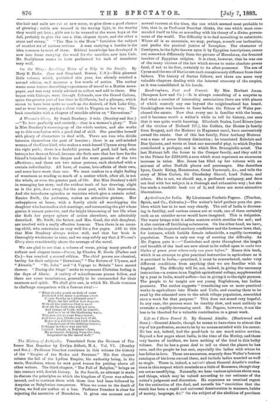Agriculture for India. By Lieutenant Frederic Pogson. (Thacker, Spink, and
Co., Calcutta.)—The writer's brief preface puts the pro- blem which has to be met very clearly. The soil of India is decreas- ing in fertility, and various causes are at work, one of them certainly such as an outsider never would have imagined. This is irrigation. The water brings with it saline matters which sterilise the soil ; and it also carries off fertilising substances. On the other hand, we have, thanks to the improved sanitary conditions and the humane laws, that, for instance, which forbids female infanticide, a rapidly-increasing population. There is only one way of meeting the difficulty. As Mr. Pogson puts it :—" Zemindars and ryots throughout the length and breadth of the land are now about to be called upon to make two blades of grass grow where only one grew before." Hence this book, which is an attempt to give practical instruction in agriculture as it is practised in India,—practised, it must be remembered, under very different conditions from anything that we are familiar with in England. The difficulty will be, not, indeed, in giving the necessary instruction—a coarse in an English agricultural college, supplemented by a year in India, would suffice—but in giving it to the right persons. The people to be taught are not young Englishmen, but Indian peasants. The author suggests "translating one or more practical • works in agriculture into Hindu and Urdu, and causing them to be read by the educated men to the adult village population, assembled once a week for that purpose." This does not sound very hopeful. In any case, the process must be terribly slow, and most unlikely to overtake a rapidly-increasing need. Mr. Pogson, however, is not the less to be thanked for a valuable contribution to a great work.


































 Previous page
Previous page